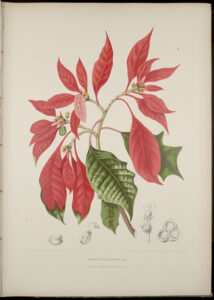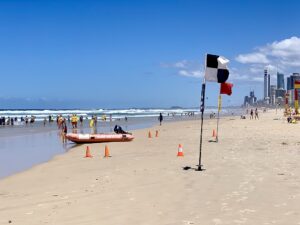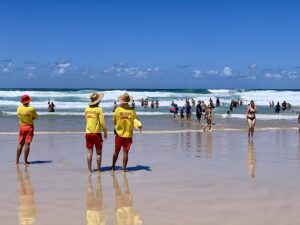Ellen Bassani

I stand embracing a small, red-leafed plant. The time is a week before Christmas. The place is the Oxford Quaker Meeting House and the bodies before me are my adopted family.
I am offering the poinsettia plant as a visual reminder of Christmases past in steamy Queensland. The children of my Quaker community are riveted. They can’t believe that the tiny plant I hold, grows to ten feet and was the backdrop to a child’s Christmas day where a swim in the Pacific Ocean was the morning’s ritual, rather than a tramp in the snow or rain.
Mum wanted us children out from under her feet on Christmas morning. The mad scramble to gather together the new beach towels, flip-flops, and sun hats – all presents from Santa – took on a noisy clamour as Dad yelled for us to hurry up. There was a rush on. Mum was getting fractious. She needed to prepare the hot Christmas lunch. Dad was tasked to keep us away for at least two hours. No real sacrifice I suspect. The day was blue and gold. The temperature rapidly rising along with the spirit-crushing humidity. The ocean gifted a breeze every visit.
To leave the driveway was never a simple matter. We’d be settled in the car. Dad would be ready to release the hand brake. Then one of us would remember the Styrofoam surfboard that must, absolutely must, be grabbed from under the house. My beloved father was a patient man. A child would open the door, jump from the seat (no seatbelts in those days), and slam the door just as dad demanded that the door be closed softly. The little figure would disappear into the darkness. Our house, like most older Queensland houses, was up on stilts. Eventually after a lifetime of impatient waiting by the rest of us, she would emerge triumphant.
About fifteen minutes later Dad would be driving up
and down the road fronting the beach looking for a parking space. The whole of Southport was following the same instinct or maternal decree. We always found a space. Doors were opened before the car stopped.
We’re talking 35-degree heat here. The tarmac, should you be foolish enough to place a bare foot down, would bubble and burn. Flip-flops, or in Australianese ‘thongs’, new and smelling of rubber, graced our feet as we slammed the doors on our run towards the sand and sea. Exhilarated, the smell of ozone and coconut oil pistoned our feet even faster.
Poor Dad would be left shaking his head. He’d have to wind each window up and lock each individual door. None of the automatic locking in those days. What care did we girls have about the extra work for our dear father? The ocean with its pounding waves called siren-like to our joyous anticipation.
If foolish enough to cast off the thongs once the fine sand began to squeak under foot, you’d feel the burn. The glorious talcum powder coral sand was as hot as the tarmac. Many a squawking visitor would be seen goose-stepping down the beach.
Towels, hats, bags, and thongs would be dropped in a pile, with just enough space to allow the next family’s privacy as it enjoyed cool drinks from the esky (insulated container for food or drink).

Every Queenslander was trained from tadpoldom to swim only between the red and yellow flags. These were placed carefully by the lifeguards to minimize the chances that swimmers might be hauled out to sea on a riptide.
We three would rush as a gaggle to the water’s edge. Our toes would meet the incoming wave at the same time. Each of us would shriek at the cold. We’re talking 78 degrees Farenheit water temperature I think – not exactly chilly. Here each child’s character would present itself. One sister and I would rush into the freezing depths and get the shock over in a flash. My other sister would edge into the water ankle upwards.

Being immersed in the glorious translucent water was bliss. Waves would pick little bodies up like rag dolls and throw them at the shore. I’d go out beyond the breakers and just flow up and over the unbroken tower of sparkling green. Sometimes the undertow would warn of a real dumper wave coming. It could be dangerous to be caught up in its curling power. I’d wait my moment until the wave was beginning to curl over my head, then dive underneath. The full power of the tons of water would jerk over my body lying at the bottom. Up I’d pop, gasping but triumphant. If I was not immediately alert to the feel of the ocean, another huge wave could knock me off my feet – and round and round I’d tumble to the shore. Now that was truly scary.
My family were a little careless with me. Neither my sisters nor my father seemed to monitor where I was. The pull of the tide might take me far along the beach outside of the flags. Conscious of no other bodies or squeals, I’d realise and make my way to shore. Then I’d stand, believing that one of them would come for me. My towel could be anywhere, and I was cold. I’d walk towards the cries of
swimmers and eventually bump into the flag. I’d wait ever hopeful. If not collected, I’d try to find my belongings by working out distances from the flagpole. Delighted would I be to find the towel, hat, and maybe my sister.
The tramp up the beach seemed endless. Then there was the tedious business of removing the sand from legs and feet before getting into the car. A towel was spread over the seat to absorb the saltwater from our swimmers.
Home we’d go to the smell of roasting meat and vegetables. The hose in the back garden would remove the rest of the sand and the saltwater. We’d then dress in our new Christmas shorts and tops, wash our swimmers, comb our hair, and proceed to the table. Mum – flushed from the crippling heat of the kitchen – would start serving our enormous Christmas dinner. Always wonderful, always too filling, we’d laugh and talk. After the dishes were washed, we’d all go and lie down for an afternoon sleep. A Queensland Christmas is an exhausting business, you know.
| Previous Article | Next Article |
Back to February 2022 Newsletter Main Page
Forty-Three Newsletter • Number 514 • February 2022
Oxford Friends Meeting
43 St Giles, Oxford OX1 3LW
